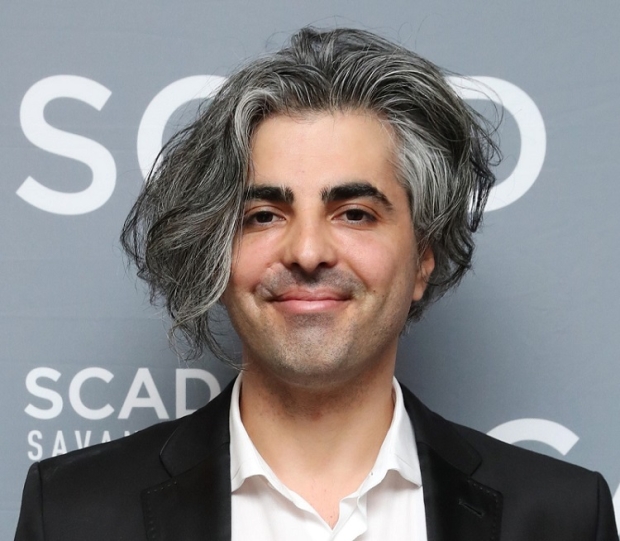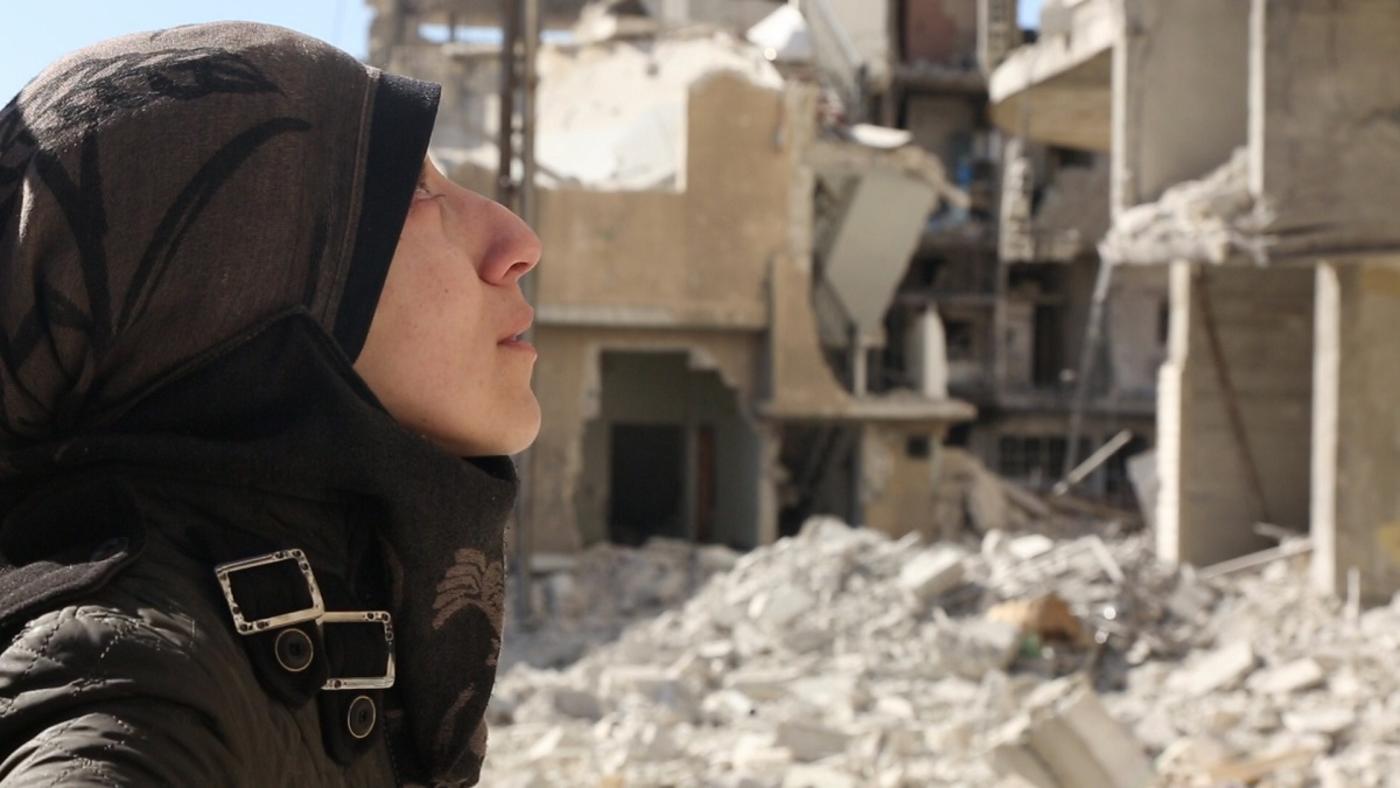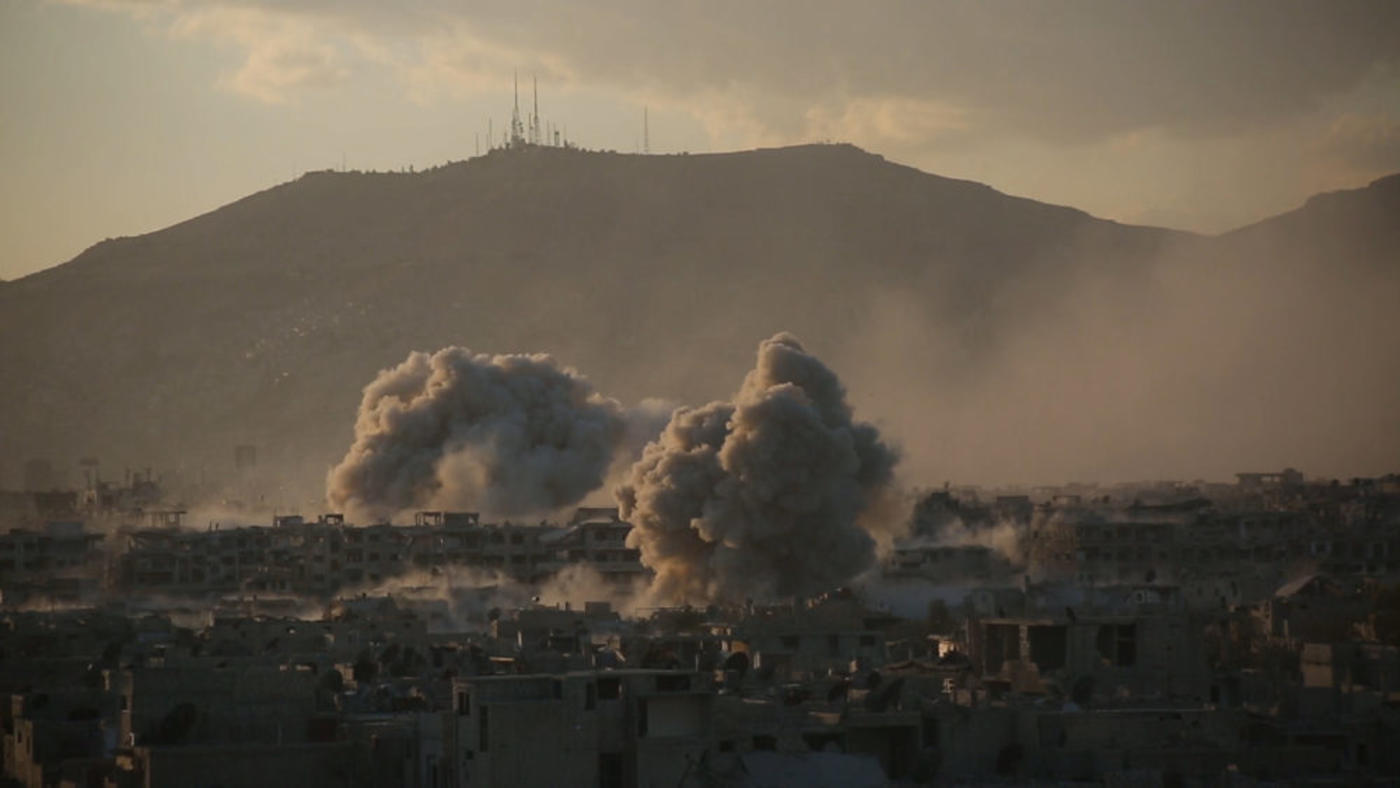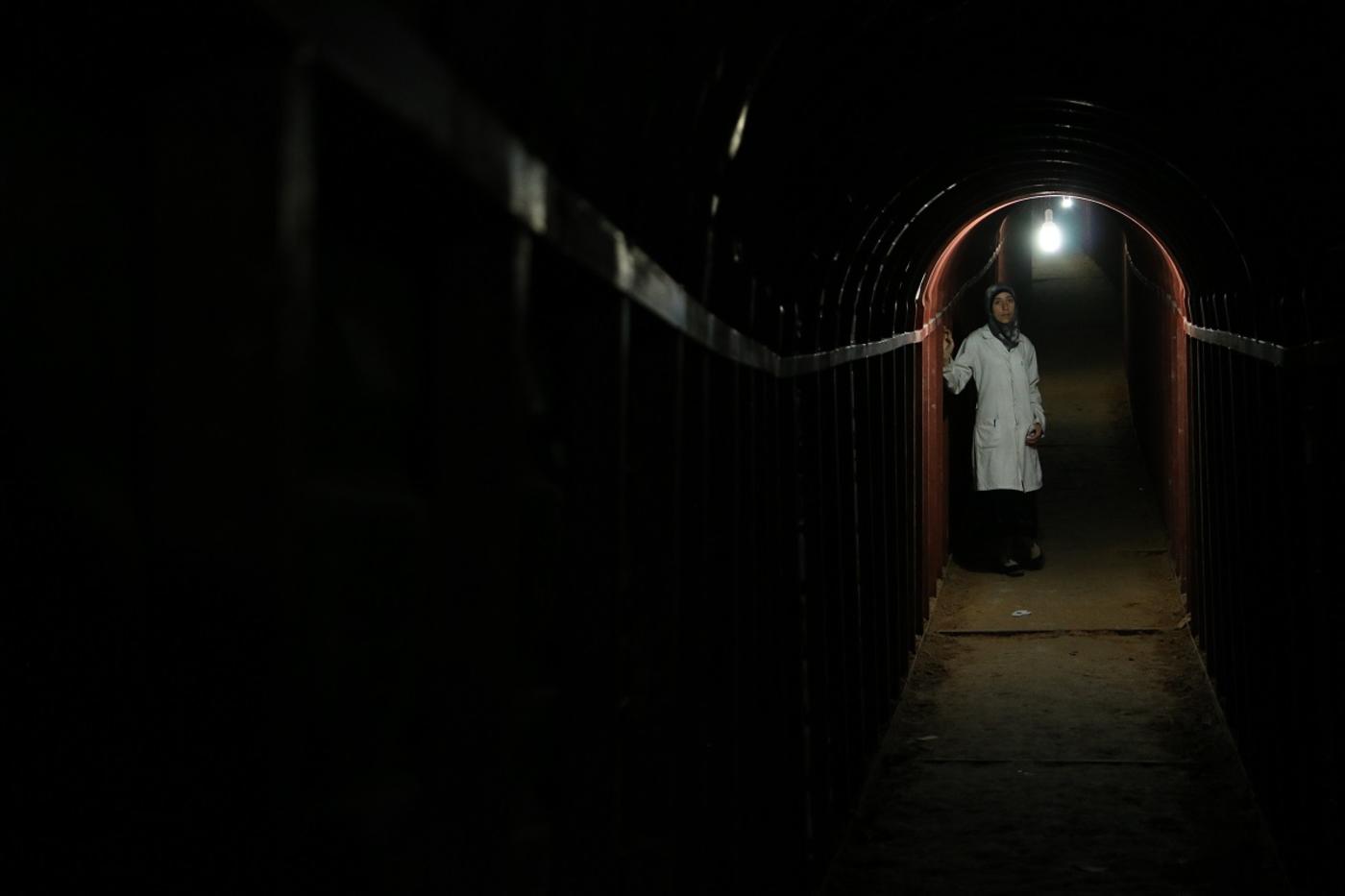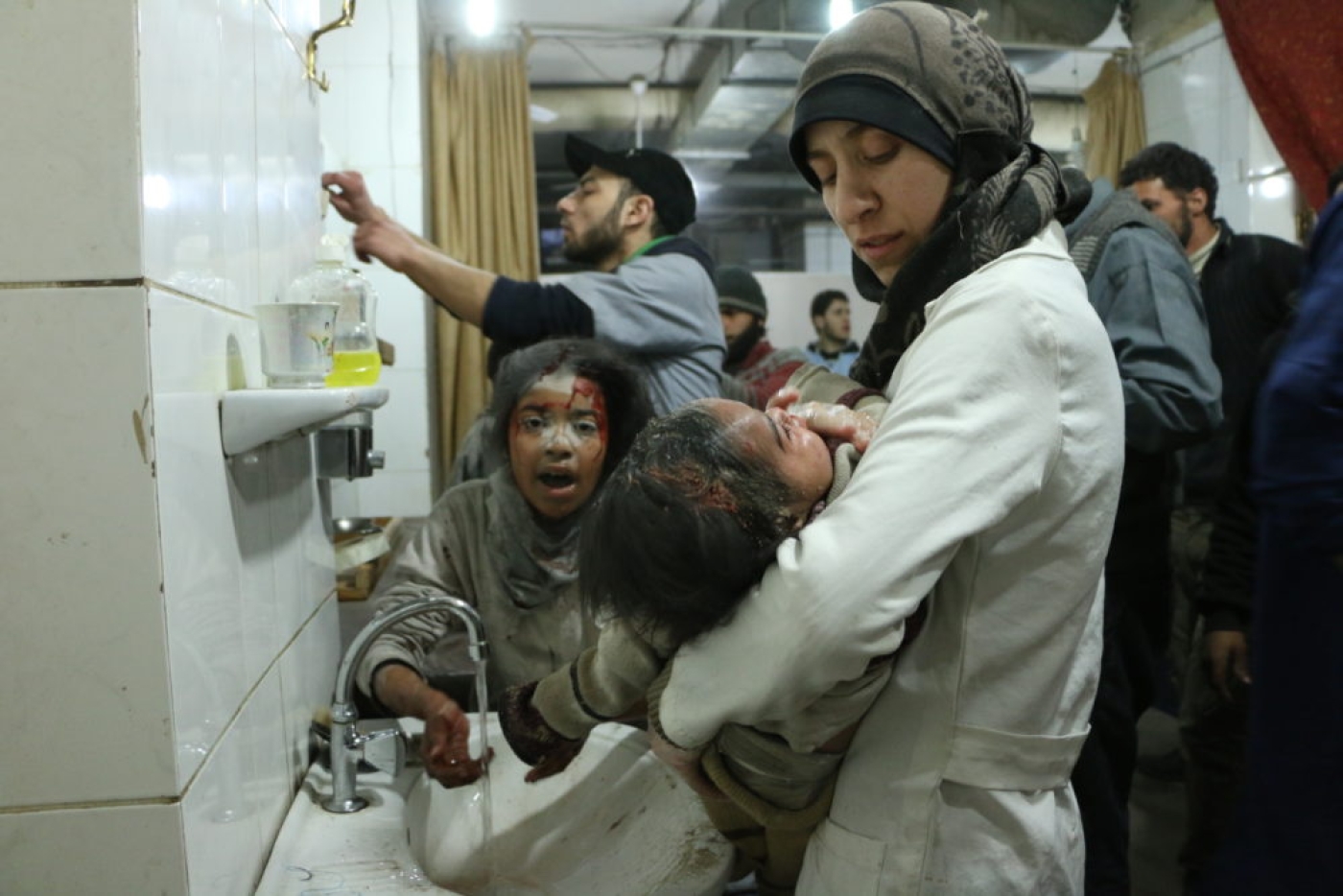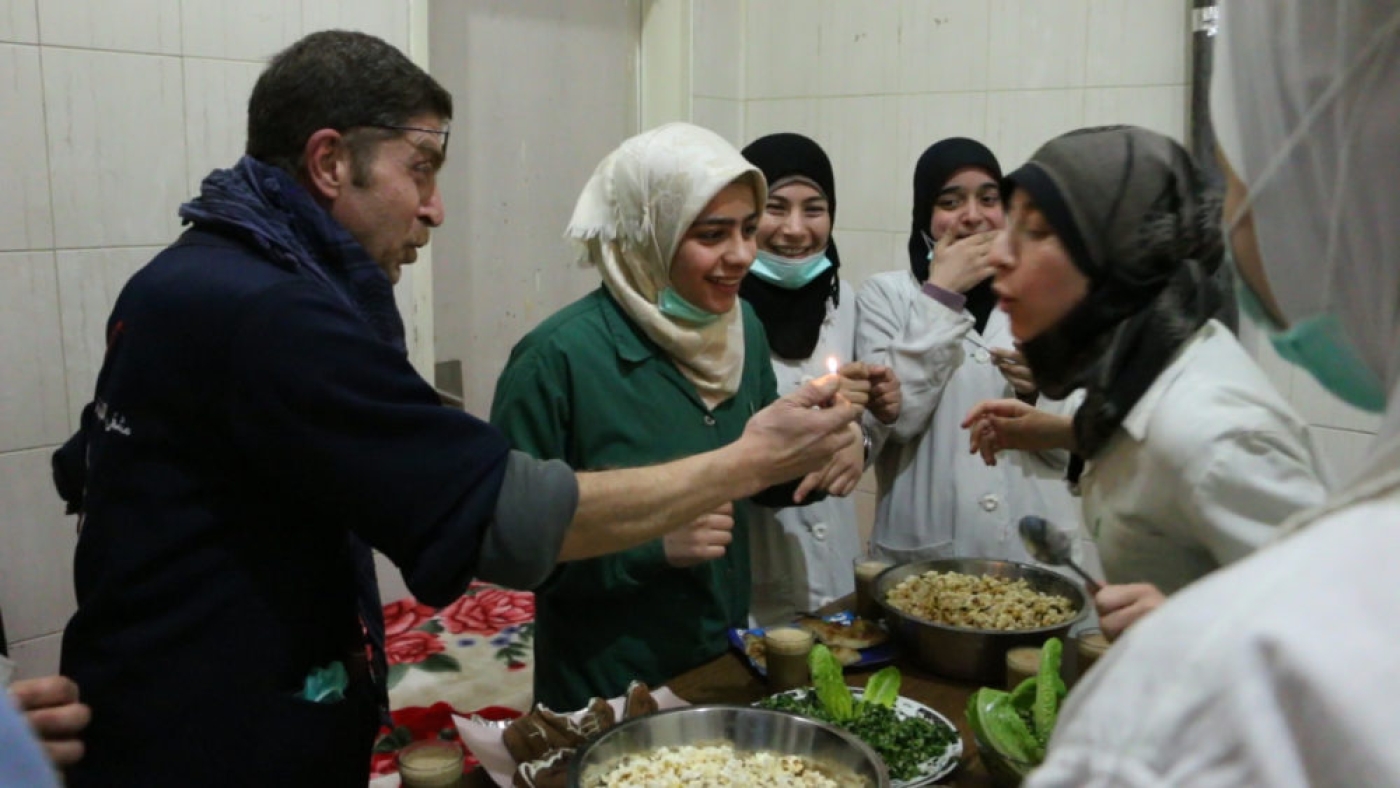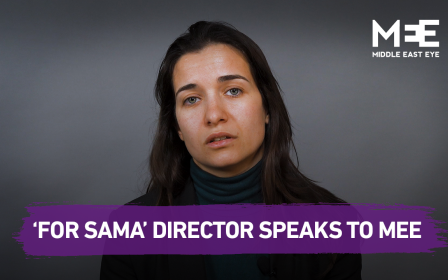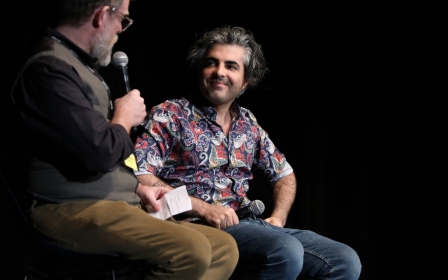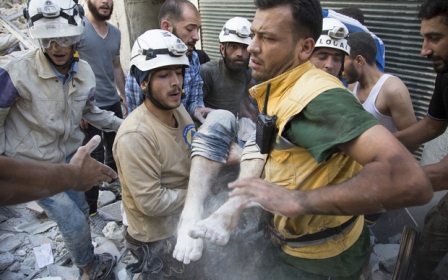Oscars 2020: How 'The Cave' reveals life in hell-hole hospital
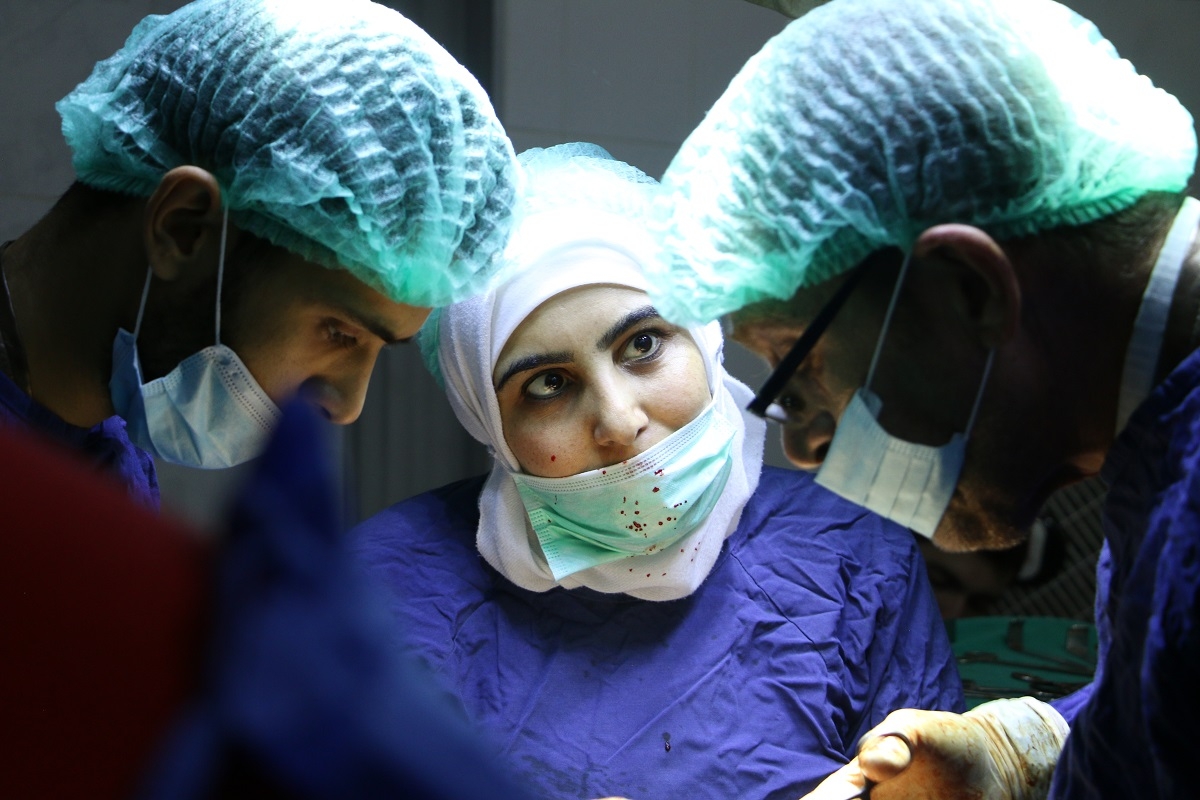
I’m midway through my Skype conversation with Syrian film-maker Feras Fayyad, who lives in Denmark, when an extraneous voice interrupts proceedings.
“It’s the cleaning lady,” the director says. “I’m staying at a hotel at the moment. I was travelling and have rented my place on Airbnb.”
I laugh.
“You didn’t think that movies make us any money, did you?” he continues.
New MEE newsletter: Jerusalem Dispatch
Sign up to get the latest insights and analysis on Israel-Palestine, alongside Turkey Unpacked and other MEE newsletters
This jarring interlude is a momentary respite from the gush of words and emotions that comprises my two-and-a-half-hour discussion with the Oscar nominee, as well as a reminder of the unglamorous reality of much of film-making in 2020.
I met Fayyad for the first time 10 months ago at Qumra, the Doha film industry event, which screened 20 minutes of The Cave, his second documentary, to a small group of producers and festival programmers. The film is produced by Danish Documentary Productions: in the United States it is distributed by National Geographic.
That footage from The Cave, which focuses on life at a hospital in Eastern Ghouta, was brutal, harrowing and highly disturbing. It was all the more agonising for its lack of a tangible narrative that would make sense of the bloodshed.
But it resonated: since then The Cave has drawn widespread praise, not least on the festival circuit. It is also one of two Syria-set features to be nominated for the Best Documentary Oscar, alongside For Sama, co-directed by Waad Al-Kateab and Edward Watts. It makes Fayyad the only Arab documentary filmmaker to receive two Academy Awards nominations - and only the second director overall after Palestinian Hany Abu Assad (Paradise Now and Omar).
“The focus of this year’s nominees on imperative and urgent global issues shows the Academy’s dedication to take a political stance towards injustices and despotic reigns,” he says. “And I’m proud to be part of that.”
Birth of a film-maker
The Cave shares much with Last Men in Aleppo, Fayyad’s 2017 debut, which detailed how the White Helmet rescue service tried to save civilians in the city at the peak of the Syrian war.
The central figure of The Cave is paediatrician and managing physician Dr Amani Ballour, an active witness to the incessant carnage but who has no power or influence to stop it. As with the White Helmets, there is no discernable end to her toils. We never see her life outside her hospital in Eastern Ghouta: Fayyad does not grant the audience the luxury of reprieve.
For the shoot he used three cinematographers from Damascus between 2016 and 2018, filming under his direction.
“Although my priority was to document what was happening in the hospital, I didn’t want it to be all shaky hand-held cameras,” he says. “I wanted to have more still images, and that’s why I recruited cameramen with strong background in photography. That cost us a lot of time naturally, as we ended up with more than 400 hours of photography.”
The camera never leaves this underground facility, capturing the disarray, the agonising violence and the insufferable claustrophobia of the earthly hellhole with unflinching authenticity. It’s tagline "Hope shines in the darkest places" could not be more misleading.
The unflinching ferocity of Last Men and The Cave are not apparent in Fayyad’s demeanour. In his mid 30s, his boyish face is capped with a large set of grey hair and melancholic eyes, communicating a palpable weariness. His success gives him more choice: current projects in development include his first foray into narrative fiction.
But Fayyad’s career achievments have yet to to blunt the trauma of incarceration and rape that he experienced at the beginning of the war in Syria. Documentary film-making was not in Fayyad’s initial plans as a teenager when he was studying cinema in Syria at the start of the new century.
“Back in the day, I wanted to make big epic movies like Lawrence of Arabia and adventure melodramas,” he says. “Documentary film-making was not something I sought to do when I was studying film.”
'I was tortured. I was raped. I witnessed the torture of women, children and elderly folks. I was tortured because of a mere movie'
- Feras Fayyad, director
His secular family, who lived on a farm between Aleppo and Ebla, were politically liberal prior to the war. His father, a political researcher, held an antagonistic stance towards Assad’s Baathist Arab nationalism, but was not supportive of the opposition communist party. Nor did he back the Muslim Brotherhood, whom, Fayyad recalls, he deemed to be as "fascist" as the other groups which dominated the political landscape of the time.
It’s this politically unaffiliated upbringing that has nurtured Fayyad’s humanism – an integral component of his film-making is that he treats all subjects equally and without prejudice.
Another person who shaped his worldview was his Kurdish mother, who, facing impending threats from Saddam Hussein during the Iraq-Iran war of the 1980s, vehemently trained her children on how to survive in different situations.
At one point the Assad security services searched Fayyad’s family home, suspecting his father of covertly writing articles against the regime. His father burnt all his writing prior to their arrival. But even though the officers did not find any incriminatory material, the fact that the house lacked a framed photo of Al-Assad made them insult and beat Fayyad’s father in front of his son.
“This instilled hatred in my heart for not just the Assad regime, but for all authoritarian rulers,” Fayyad says. “It also made me detest the idea of a partisan rule; it made me realise that what matters is the individual, irrespective of their political and ideological affiliation.”
It’s this sheer instinct for survival and disdain for any authority figures that has informed Fayyad’s work to date. His family are still stranded in Syria.
A country razed to the ground
Fayyad's first brush with the authorities came in 2011, briefly before the attempted revolution. At the time he was trying to make On The Other Side, his unrealised first feature, about the oppositional Syrian poet, Ja'far Haydar, who was exiled to the Czech Republic during the 1980s, and used Arabic to promote ideals of freedom and challenge Arab nationalism.
During the shoot in Syria, Fayyad was arrested, initially for three months. “I was tortured. I was raped,” he recalls. “I witnessed the torture of women, children and elderly folks. I was tortured because of a mere movie.”
Different organisations, especially Reporters Without Borders, succeeded in forcing the authorities to release him. His first arrest did not deter him from shooting – but he was detained again later that year, this time for 12 months.
“I didn’t think I would be discharged,” he says. “I saw prisoners tortured to death and I presumed that my fate would be the same.
“At some point, I just wished I’d die to have this bestial torture stop. I was told I was not going to see the light of day again, that nobody could come to my aid, that I would never be able to make movies again.”
Fayyad was eventually released in 2012 by Syrian intelligence after UN intervention. He had been held for 12 months: on emerging, he was stunned to find entire towns and cities had been razed to the ground during his imprisonment.
He began documenting this destruction for what would eventually become the starting point for The Cave. He then escaped to Jordan in 2013, although later returned to Aleppo incognito, via Turkey to shoot more than 150 hours of material that ended up forming the basis for both films.
Yet Fayyad had no preconceptions beforehand of what he would do with the footage. In both cases, he says, the stories arose organically, with the protagonists in each determining their dramatic narrative and direction.
Both films are driven by Fayyad’s desire to place the audience in the shoes of his Syrian characters, to thrust them into the relentless audio ferocity of the unfolding violence and to recreate the physical experience of the war.
“As a Syrian, I have an obligation towards my fellow countrymen,” he says. “I’m no longer able to carry the wounded and bury the dead. I’m no longer able to carry arms and defend the place my family resides in. The only thing I can do now is expose the truth, to show what’s happening in Syria to the biggest audience there is.”
He continues: “I also wanted to establish the possibility of heroism in the heart of despair. I did not want to see another white man coming in and saving the day. I wanted to show our heroes the way they are, unpolished.”
'The tools at my disposal'
For Sama is seen as the more likely winner in the Oscars race – if it can beat favourite American Factory, which is distributed by Netflix under their deal with Barack and Michelle Obama.
It’s understandable: For Sama is boosted by a straightforward narrative, a highly likeable heroine in its co-director and a liberating conclusion as Al-Kateab escapes from Syria. It’s immensely emotional and undeniably powerful, a taxing and sincere story of hope lost and found.
But its tidy narrative softens its rougher edges. The footage is truly unnerving, but what ultimately lingers is her passage to safety. In that sense, For Sama is possibly the most fully-realised account of the Syrian war: a poignant story of love, courage and sacrifice, as well as a testament to Assad’s crimes.
In contrast The Cave has no plot to frame Amani’s efforts within a meaningful narrative. There is no tangible resolution to the unfolding nightmare nor emotional oomph to inject some catharsis. It is also more complex: not everyone in The Cave is sympathetic. Amani comes over as a defiant feminist who chose to marry late and maintain her independence. She constantly challenges the domineering forces of patriarchy, including victims’ fathers who tell her that a “women’s best place is in the house”.
The film has been criticised for perceived overproduction, due to elaborate visuals and emotive music. Fayyad, however takes issue.
“My primary objective is to create the most immersive experience of what is happening on the ground,” he says. "I have the right to use the tools at my disposal to recreate this effect. The music conveys the unobtrusive anger of my characters. It comes down to personal preferences. I could’ve adopted a rawer approach, but I didn’t want to.
“I am documenting the horrors of the war, but I’m also creating cinema. I don’t believe that the two should be mutually exclusive.”
Refused entry to the US
For all their acclaim, Fayyad’s films have scarcely been screened in the Middle East and North Africa, where most Syrian documentaries are sidelined.
Fayyad believes it reflects the stance of governments – which often fund film festivals - towards what he calls the “Syrian revolution”, which he describes as “the peaceful, civilian, secular resistance that was hijacked by the Islamists and tarnished by the government.”
It’s affirmed by recent comments at the Cairo Film Festival, when the Syrian Oscar nominees were accused of catering to the tastes of Academy voters by painting a “victimised portrait” of Syria.
In recent weeks, Fayyad made headlines when he was denied a visa to the US. The long, absurd ordeal has finally been resolved.
Fayyad was granted the Business and Tourist Visas in 2018 for Last Men, enabling him to make multiple visits to the US for promotional work. But when he applied again for the same visa a few weeks ago, Fayyad was told it could not be duplicated as he had used a different visa (01 – for those who have extraordinary ability in the arts and sciences) in the interim for post-production on The Cave.
Upshot: Fayyad was refused permission to enter the US. Disney, the parent company of National Geographic, provided more paperwork, to no avail. The documentary and entertainment community rallied around – Arab organisations were distinct in their absence – and the visa eventually granted. But the senseless experience has left Fayyad daunted.
“I’ve prepared myself not to be emotionally or mentally shocked anymore, but I still can’t bring myself to accept it. This is not just about me though. I’m lucky to be where I am, but there are many who do not have voices or names that can get them through similar trials.
“We need to challenge the narratives enforced on the public by devious politicians who are bending truths to their gains. Collective efforts are needed to change this reality; it should never be contingent on one individual."
This article is available in French on Middle East Eye French edition.
Middle East Eye delivers independent and unrivalled coverage and analysis of the Middle East, North Africa and beyond. To learn more about republishing this content and the associated fees, please fill out this form. More about MEE can be found here.


